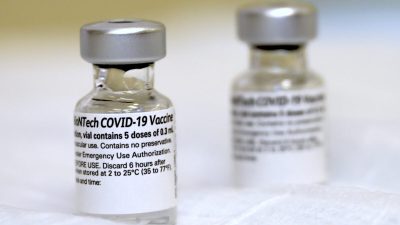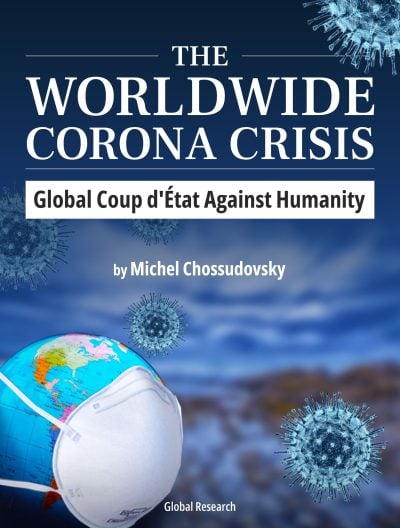Poll: 1 In 4 Americans Thinks Someone They Know May Have Died Due to COVID Shot
That the poll was even conducted indicates a sea change in attitudes toward the Covid shots. It’s now finally acceptable to discuss fatal adverse events.

All Global Research articles can be read in 51 languages by activating the Translate Website button below the author’s name.
To receive Global Research’s Daily Newsletter (selected articles), click here.
Follow us on Instagram and Twitter and subscribe to our Telegram Channel. Feel free to repost and share widely Global Research articles.
***
The U.S. government has still not formally admitted to any deaths directly attributable to the fast-tracked, emergency-authorized mRNA Covid shots, which comprise the vast majority of all doses administered, rolled out more than two years ago. Nevertheless, a new Rasmussen poll finds more than a quarter of adults think they “personally know someone whose death may have been caused by side effects of the COVID-19 vaccines.”
Rasmussen’s results are stunning, but the fact that Rasmussen decided to conduct this poll in the first place is perhaps more politically and culturally significant. It indicates a sea change in attitudes toward the jabs.
At the onset of mass vaccination, major platforms including Facebook, YouTube, and Twitter put in place strict speech codes that proscribe framing the Covid shots as “dangerous.” News outlets and pundits have often accused those who question the safety of the shots of spreading “dangerous misinformation” and promoting “vaccine hesitancy.” Even right-leaning outlets such as Fox News largely refused to give credence to those warning that the shots may be far less safe than advertised. Yet now, in 2023, a major polling firm is reporting that a substantial minority (28 percent) of Americans suspect someone they know died from adverse events caused by Covid vaccination.
Suspicion, of course, is a far cry from proof. But the sheer prevalence of such suspicion should prompt serious inquiry from the Food and Drug Administration and Centers for Disease Control and Prevention and public debate that isn’t quashed or watered down by censors.
Other Polling Patterns
The poll also found younger people were more likely than older people to say someone they know may have died due to side effects from the shot: 35 percent of adults under 40, compared to 28 percent of those aged 40 to 64, and only 14 percent of those over 65.
Most interestingly, more Democrats than Republicans think someone they know may have died from jab side effects (33 percent to 26 percent). Democrats are more likely to have been vaccinated themselves, and thus more likely to associate with people who are also vaccinated. The more people one knows who have been vaccinated, the higher the likelihood of reporting a suspicion of vaccine-related death.
Additionally, as Covid-response skeptic Igor Chudov has pointed out, more married people than unmarried report knowing someone who may have died from an adverse event (33 percent to 23 percent). Not only do the social circles of married people tend to be larger, but Rasmussen reports that married people were more likely to be vaccinated.
Pollsters also found concerns about the shots’ safety are higher among the unvaccinated. A full three-quarters of the un-jabbed think it’s “at least somewhat likely that side effects of COVID-19 vaccines have caused a significant number of unexplained deaths.” Many unvaccinated didn’t take the jab due to concerns the shots weren’t sufficiently proven to be safe, so this stands to reason. On the other hand, those who’ve taken the vaccine have far more incentive to believe the drug they willingly took is safe. (Some may have taken it due to employer mandates or other requirements, however.) People are not inclined to believe they risked their health unnecessarily. Even so, 38 percent of those who’ve taken the jab also believed the shot was “at least somewhat likely” to have caused “a significant number of unexplained deaths.” That is a substantial minority.
Can a drug be considered “safe” if it’s “somewhat likely” to have caused a “significant number” of deaths? Is it reasonable to conclude from these results that a substantial minority of people who’ve taken the drug themselves do not believe the shots to be safe? A belief they’ve possibly caused a “significant number of unexplained deaths” would certainly put the Covid shots well below the level of perceived safety that most childhood vaccines are widely considered to have.
Maybe booster uptake has been so low not due to doubts about adequate testing or efficacy, but because more people are wary of it than before. A Rasmussen report from Dec. 7 found 57 percent of respondents were concerned about “major side effects,” including 43 percent of Democrats who were “at least somewhat concerned.” Seven percent of respondents reported “major side effects” from the shot.
Chudov discusses paywalled portions of the new poll here, including a curious finding that those “other” than whites or blacks were significantly more likely to say they know someone who may have died from an adverse event.
More Investigation Needed
The findings of the new poll on beliefs about deaths post-vaccination come a full two years after the initial rollout of the shots, which were marketed at the time as being more than 90 percent effective at preventing infection and almost 100 percent effective at preventing death from illness caused by infection with the SARS-COV-2 virus. Rasmussen conducted a poll on concerns over vaccine side effects in November 2021, but if the firm had polled about suspicion of deaths caused by the shot multiple times since vaccine rollout, we would have a better idea of how beliefs about the safety of the Covid shots have shifted. As more and more medical professionals and experts speak out, it is becoming more acceptable to ask questions that may yield frightening answers.
Our public health establishment has fallen prey to the sunk-cost fallacy. It is too terrible for them to imagine that the shots they pushed so aggressively could turn out to be unsafe, or at least a very poor risk-benefit tradeoff for many people. Because of this, honest, rigorous, and continuous investigation from both inside and outside public health agencies is all the more critical.
*
Note to readers: Please click the share buttons above. Follow us on Instagram and Twitter and subscribe to our Telegram Channel. Feel free to repost and share widely Global Research articles.
Georgi is a Senior Contributor at The Federalist and host of The 180 Cast, where she interviews people who have changed their minds on important political and social issues. She is a regular guest on Kevin McCullough Radio and other talk radio programs, and her editorial writing brings Christian and conservative principles to the foreground. She is also the co-author of “Clocking Out Early: The Ultimate Guide to Early Retirement,” and enjoys a comfortably frugal life in central Washington with her family.
Featured image is from WIKIMEDIA COMMONS/U.S. SECRETARY OF DEFENSE/CROPPED/CC BY 2.0
 The Worldwide Corona Crisis, Global Coup d’Etat Against Humanity
The Worldwide Corona Crisis, Global Coup d’Etat Against Humanity
by Michel Chossudovsky
Michel Chossudovsky reviews in detail how this insidious project “destroys people’s lives”. He provides a comprehensive analysis of everything you need to know about the “pandemic” — from the medical dimensions to the economic and social repercussions, political underpinnings, and mental and psychological impacts.
“My objective as an author is to inform people worldwide and refute the official narrative which has been used as a justification to destabilize the economic and social fabric of entire countries, followed by the imposition of the “deadly” COVID-19 “vaccine”. This crisis affects humanity in its entirety: almost 8 billion people. We stand in solidarity with our fellow human beings and our children worldwide. Truth is a powerful instrument.”
ISBN: 978-0-9879389-3-0, Year: 2022, PDF Ebook, Pages: 164, 15 Chapters
Price: $11.50 Get yours for FREE! Click here to download.
We encourage you to support the eBook project by making a donation through Global Research’s DonorBox “Worldwide Corona Crisis” Campaign Page.

